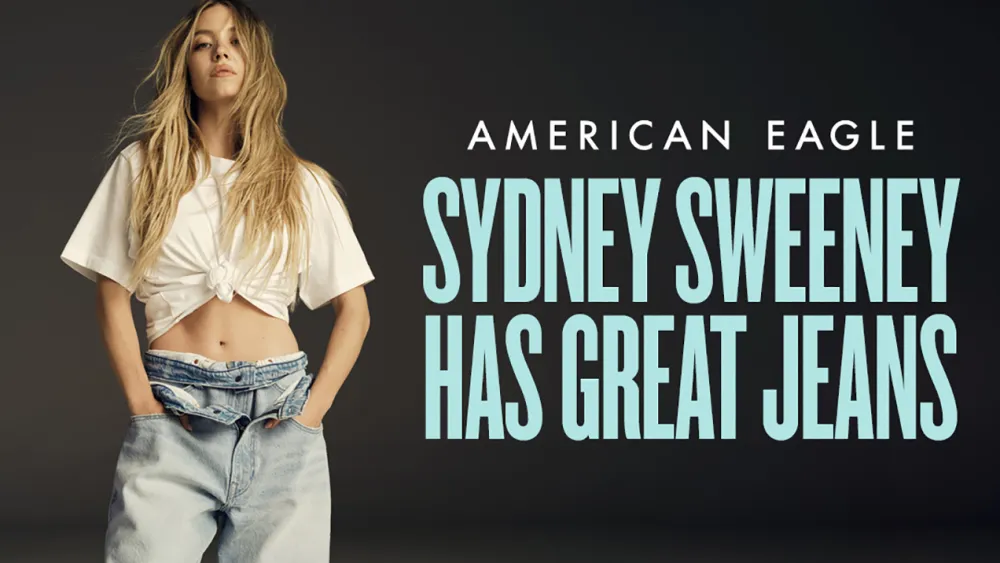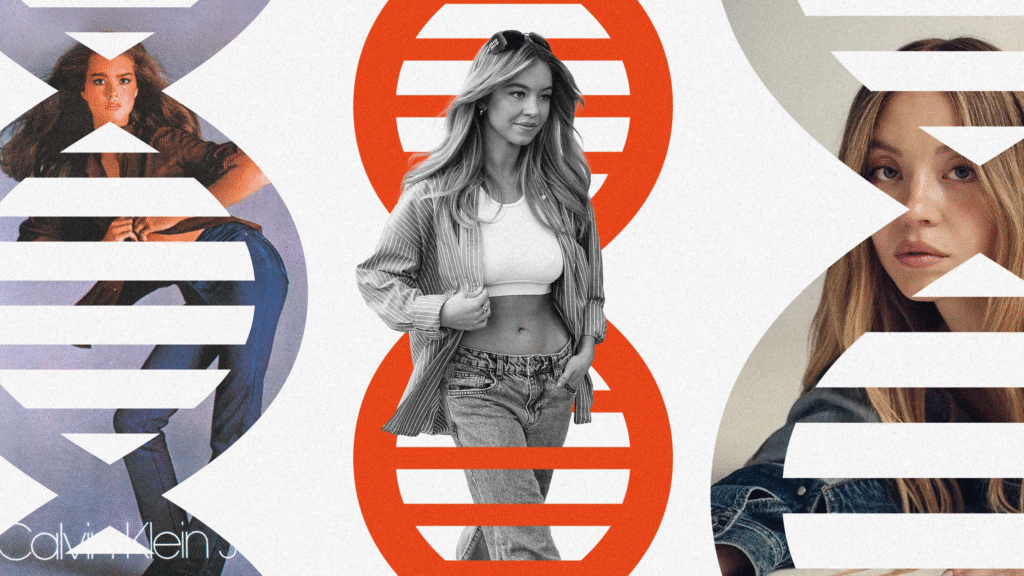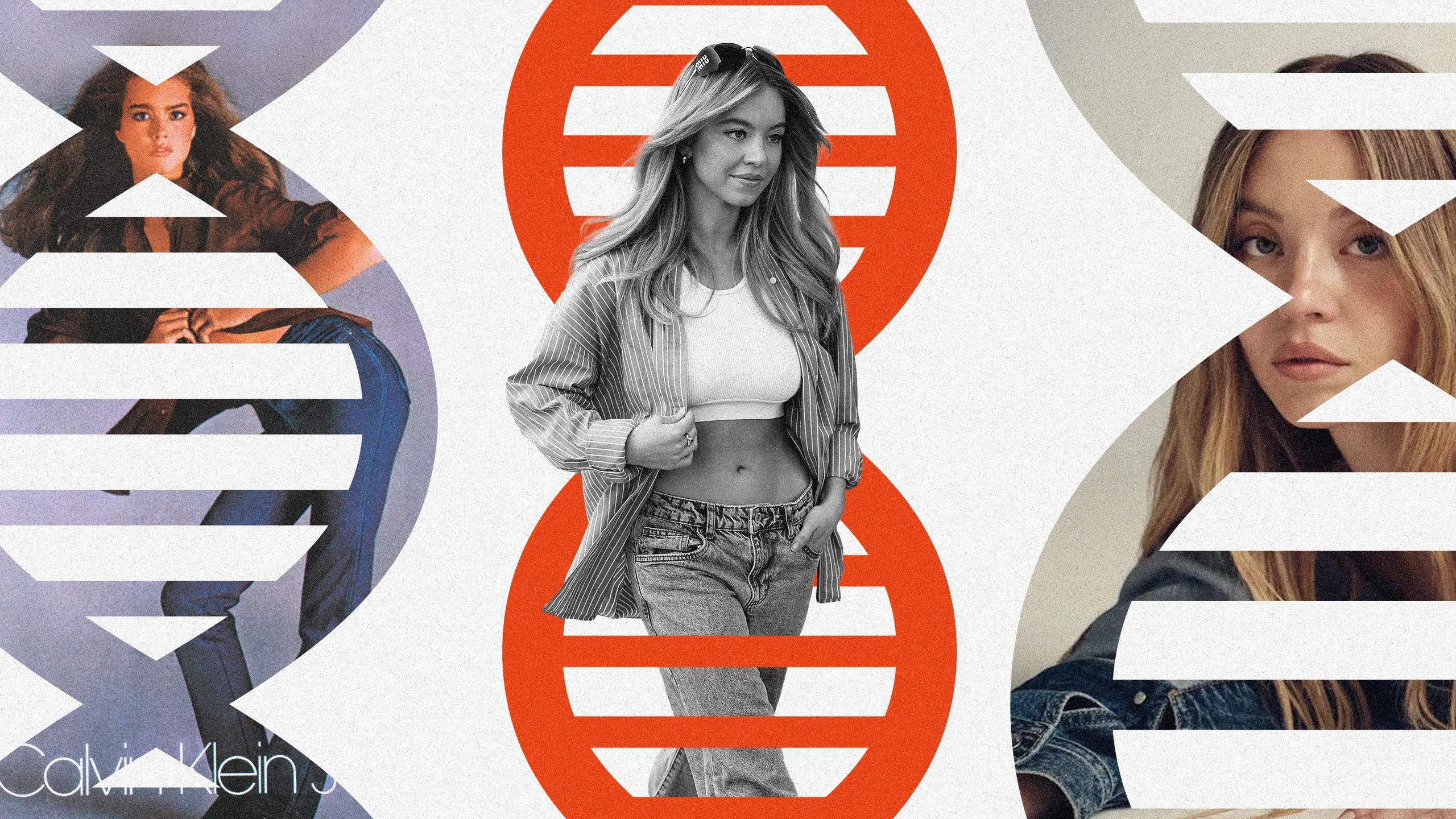By Kalpana Pandey
On July 23, 2025, the clothing retail giant American Eagle released a highly controversial advertisement featuring young actress Sydney Sweeney. At a time when the company was struggling with financial losses, the campaign sought to capture the attention of its core demographic—young women—by casting Sweeney, whose fair skin, blonde hair, and blue eyes have become part of her public persona. The ad, with its simple tagline “Sydney Sweeney Has Great Jeans,” attempted a clever play on words, intertwining the homophones “jeans” and “genes.” In the commercial, Sweeney says, “Genes are passed from parents to offspring, determining characteristics like hair color, personality, and even eye color.” As the camera pans from her denim outfit to her face and blue eyes, she adds, “My genes (jeans) are blue,” tying her eye color to the wordplay. The intent was to link the concept of attractive, desirable traits—through genetics—to the appeal of wearing fashionable denim, a seemingly harmless marketing strategy.
However, the advertisement quickly went viral across TikTok, Instagram, and YouTube, attracting not just attention, but widespread criticism. Many questioned the necessity of mentioning genetics in a jeans commercial, and even more pointedly, why the focus on her blue eyes rather than the clothing itself. These questions escalated into a broader controversy, with social media users accusing the campaign of implicitly promoting eugenics. Allegations of racism and references to Nazi ideology began to surface online, sparking heated debates across multiple platforms. In response to the backlash, American Eagle withdrew the advertisement within a few days. Yet, paradoxically, the campaign initially achieved significant commercial success: the company’s shares on the New York Stock Exchange (NYSE: AEO) rose by 24% following the announcement—the largest surge for the brand since the year 2000. In stores, Sweeney’s jeans quickly sold out, and the campaign drew comparisons to the iconic Brooke Shields ads for Calvin Klein in the 1980s, known for their provocative impact on popular culture.

While American Eagle attempted to contain the backlash, Sydney Sweeney herself remained silent, refusing to comment publicly on the controversy. Political figures, however, quickly entered the fray. In a striking endorsement, the American President tweeted in support of Sweeney, while Vice President J.D. Vance praised her as “all-American beauty.” Former President Donald Trump publicly weighed in on August 4, calling it “her hottest ad” and highlighting Sweeney’s political affiliation as a registered Republican. This claim was later verified by multiple reputable media outlets, including The Guardian, BuzzFeed, and Newsweek, which confirmed through Florida voter registration records that Sweeney had officially joined the Republican Party on June 14, 2024. The actress’s past, including photographs from a 2022 family birthday party featuring MAGA-themed hats worn by guests, added fuel to the conversation, further solidifying the political framing around the advertisement.
Trump’s response and the subsequent defense by prominent Republican voices underscore the broader ideological context. Subtle yet pervasive, Trump’s rhetoric often emphasizes cultural anxieties and perceived threats to white identity, framing demographic change as a challenge to social and political dominance. This approach is evident in his frequent critiques of movements like Black Lives Matter, contrasted with leniency toward predominantly white nationalist demonstrations, such as the Charlottesville “Unite the Right” rally. In this light, Sweeney’s Republican affiliation, combined with her ad’s focus on fair-skinned beauty and “good genes,” aligns with the narratives championed by Trump and his political base. White House spokesperson Steven Cheung dismissed the criticism as an example of “cancel culture run amok,” arguing that overinterpretation of a commercial had escalated unnecessarily into a national debate over boycotts and social accountability.
Beyond political endorsements, the ad itself has been analyzed as an unsettling echo of eugenics. The phrase “good genes” in contemporary vernacular may seem innocuous, often employed to compliment physical appearance. Yet the historical undertones are deeply troubling. Eugenics, a pseudo-scientific ideology that emerged in the 19th century, sought to enhance human populations by selectively encouraging reproduction of “desirable” traits while discouraging or forcibly preventing the propagation of others. By the 20th century, eugenics had become intimately associated with racism, discrimination, forced sterilization programs, and, ultimately, Nazi genocidal policies. Though widely discredited today, the ideology continues to leave traces in subtle cultural messaging, including media and advertising that valorizes certain traits as inherently superior. Sweeney’s statement that her “genes are blue” may appear playful on the surface, yet it resonates with a long history of racialized notions of beauty, purity, and desirability.
Understanding the political reaction to the ad requires examining recent policies and rhetoric. Since January, former President Trump has taken aggressive stances on immigration, border control, and the rollback of diversity, equity, and inclusion initiatives. Public comments referring to “good genes” in political rallies, statements linking immigrants to criminality, and language echoing the Great Replacement Theory—a controversial idea suggesting white Americans face demographic displacement—demonstrate the persistence of eugenics-adjacent ideology in contemporary politics. Conservative media figures and business leaders have further reinforced these ideas, framing cultural and racial anxieties as matters of policy and social priority.

In advertising and media, the subtle perpetuation of eugenics continues to manifest in what is deemed attractive, pure, or desirable. While the overt scientific and political programs of the early 20th century have been rejected, the cultural residue of these ideologies remains. Words like “good genes,” once innocuous in casual conversation, carry historical weight and ethical responsibility. The American Eagle commercial serves as a stark reminder of this lingering influence, highlighting the enduring interplay between marketing, politics, and racialized social narratives. Behind a seemingly trivial campaign for denim lies a cautionary tale: the history of eugenics is never entirely buried, and its remnants can resurface in unexpected and uncomfortable ways, shaping perceptions, reinforcing biases, and sparking debates that extend far beyond the aisles of a clothing store.
Ultimately, the blue jeans advertisement is more than just a marketing misstep; it is a mirror reflecting the subtle, persistent shadows of eugenics in contemporary culture, reminding society that the legacy of discriminatory ideologies is never fully eradicated, and vigilance in interpreting media messages remains crucial.
The views expressed in this article are solely those of the author and do not necessarily reflect the opinions or views of this newspaper
